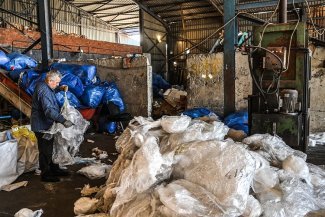Villagers cross through receding waters in an area of flash flooding at Solai in Subukia, Nakuru County on 10 May 2018. There has been an increasing in floods in Kenya’s Rift Valley over the past four years. In 2020, more than 5,000 people were displaced at Lake Baringo alone.
After 18 months of lockdowns, closed borders, grounded flights and travel restrictions, the global tourism industry is still reeling from the impact of Covid-19. One of the countries where this devastation has been most keenly felt is Kenya. Prior to the pandemic, the tourism industry accounted for 4.4 per cent of Kenya’s GDP and every year it welcomed over two million visitors. However, 2020 saw a 72 per cent reduction in tourist arrivals to Kenya, costing the industry an estimated US$1 billion in revenue.
But even before the pandemic, Kenya’s tourism industry was attempting to weather another storm: climate change. Over the past few years, trade unionist Susan Wanjiru has watched in shock as scores of fellow members of the Kenya Union of Domestic, Hotels, Educational Institutions, Hospitals and Allied Workers (KUDHEIHA) have lost their jobs due to the closure of lakeside hotels in the country’s Great Rift Valley, one of Kenya’s main tourism hubs.
The closures witnessed over the past four years are a result of rising water levels on the lakes, most notably around Lakes Baringo and Naivasha, caused by unusually heavy rainfall, land use changes and the loss of wetlands. At Lake Baringo, floods displaced more than 5,000 people in 2020.
“During the floods, we see hotels, homes and roads get submerged. Some of the hoteliers are unable to recover from the flooding so they are forced to close their business. This means the workers lose their jobs,” says Wanjiru, who is the branch secretary for KUDHEIHA in Nakuru, Kenya’s fourth largest city based in the Great Rift Valley.
And away from the lakes, at the world-famous Masaai Mara game reserve, the impact of climate change can be felt there too, with erratic rainfall and prolonged periods of drought contributing to declining wildlife populations. “We have seen jobs threatened at the Mara and the reduction of water volumes in the Mara River owing to degradation of the Mau Water Tower. The wildebeest migration has been greatly affected leading to low tourist turn out. This has hit many workers and livelihoods hard,” Wanjiru notes.
The situation has not only left her union with reduced membership (of 2,000 KUDHEIHA members in the Rift Valley area, at least 77 have lost their jobs in the past two years, she says), but it has also left former employees in the hospitality industry without an income, which puts their families and communities at great risk.
Partnership, outreach and action
Motivated by a desire to educate her colleagues and their communities about the consequences of climate change and what can be done to prevent, mitigate or adapt to the worst effects, two years ago Wanjiru was designated a ‘green champion’ in KUDHEIHA. “Kenya is highly dependent on climate-sensitive natural resources – such as the forests, the coast, the lakes, both marine and land wildlife – for the livelihoods of millions of people. With the changing climate conditions, we are very vulnerable,” she cautions.
Her role as a climate awareness advocate includes efforts to mainstream just transition and climate policy strategy throughout Kenya’s trade union movement. Kenya’s trade unions have been working on such efforts since 2016, including an earlier partnership with the Danish International Development Agency. The work of the unions received a huge boost in 2019, when Kenya’s national trade union centre, the Central Organization of Trade Unions Kenya (COTU-K), formed a partnership with the German foundation Friedrich-Ebert-Stiftung (FES) to build the understanding and capacity of trade unions on climate issues. At a sectoral level, KUDHEIHA has been doing similar work with the International Union of Food, Agricultural, Hotel, Restaurant, Catering, Tobacco and Allied Workers’ Associations (IUF).
Over the last two years, various training and workplace actions have taken place to help both workers and employers learn to adapt to the adverse effects of climate change and to increase environmental awareness.
Initiatives have included partnering with hotel managers in the Great Rift Valley to plant trees, participating in beach clean-ups, sensitising tourists to water and energy conservation and the banning of plastic bags from wildlife parks.
Robert Muthami, a programme coordinator at FES Kenya, says his organisation has been working with COTU-K workers in sectors spanning energy, health, hospitality, tourism and manufacturing to support efforts towards energy transition, as well as working on policy. “We have assisted workers’ unions in drafting a just transition framework for Kenya which provides a guideline for effective negotiations without any gaps. In the past, the voice of the workers has been missing,” he tells Equal Times.
The unions have also been lobbying business leaders in the hospitality sector to invest in green infrastructure such as renewable energy. This has already produced positive results: “During various trips to the national parks we have engaged with the managers of the different tourist establishments,” says Wanjiru. “Thanks to our sensitisation, most of the hotels that we represent have installed solar panels for their energy needs. Some have also updated their power systems so that air conditioners and lights automatically switch off once the guest leaves their rooms.”
With the support of COTU-K and FES, KUDHEIHA has also been working for the inclusion of a climate change clause in the hotel sector’s collective bargaining agreement (CBA), which is currently under review. This, Wanjiru observes, will bring more “ownership and commitment” to climate issues for both workers and employers.
Muthami of the FES says there were some initial challenges in the attempts to mainstream climate action in Kenya’ s trade union movement: “Building a mass within the movement to champion the just transition concept has not been easy. And unions still need to do more to build alliances with other actors such as civil society,” he advises.
But at the worker-level, Wanjiru, who is one of approximately 20 green champions in the Kenyan labour movement, says she has experienced an extremely positive response to these outreach initiatives, mainly because “each one of us has at some point already suffered from the effects of climate change”.
Building an army of environmental experts at the trade union level
As a COTU-K affiliate, KUDHEIHA has also been part of the critical mass that is pushing for an amendment of the Kenya Climate Change Act 2016 to provide for inclusion of COTU-K as a part of the National Climate Change Council.
“Workers can help influence national policies to enhance decent work and ensure a sustainable work environment for workers in both the formal and informal economies, as well as for the good of society as a whole,” says Rebecca Okello, a climate policy advisor at COTU-K.
Until now, trade unions have been left out of the council, which not only locks workers out of policy formulation but also impacts the implementation of climate strategies. But as much as the unions are calling for greater social dialogue with the government, efforts to create a ‘green movement’ within the affiliates of COTU-K, have been going well; there are now two green representatives trained within each affiliated union.
“The aim is to come up with environmental experts at the trade union level and to build the capacity for participation and in advocating for a just transition in Kenya. We also hope to enhance workers’ understanding of the relationship between environmental protection policies and workplace conditions,” Okello tells Equal Times.
With training supported by FES, another objective is to ensure that trade unionists at all levels can include climate issues in all negotiations that they take part in, thus expanding beyond the traditional focus on pay and workplace conditions.
“We trust that we are building an army of trade unionists that are well-versed in the modern ways of organising workers around emerging issues, and who have the capacity to negotiate all-round CBAs with employers and authorities,” Okello says. This, she says, is producing positive results for COTU-K affiliates such as KUDHEIHA and the Kenya Electrical Trades and Allied Workers Union (KETAWU).
“Already we are seeing a huge improvement in the capacity for union leaders to engage in broader work and climate issues. As well as promoting a green and just transition for sustainable development, they are also better able to offer analysis of national legislation such as Kenya’s Nationally Determined Commitments (NDCs) and the implementation of trade union responses,” the officer observes. However, there is still some way to go before this increased union knowledge has a purposeful impact on national policy: in the most recent update of Kenya’s NDCs (from December 2020) there is only a cursory mention of just transition.
Kenya: a regional champion in renewables
Still, there is much to celebrate in Kenya. Between 85 and 90 per cent of Kenya’s electricity supply comes from renewable (mainly hydroelectric and geothermal) sources which makes it the East African regional leader in clean energy. Ernest Nadome is the assistant secretary general of COTU-K and general secretary of KETAWU, a trade union at the heart of Kenya’s energy sector. He says it is crucial for unions to make sure that workers have the right skills to meaningfully participate in a just transition.
He says KETAWU is working hard on skilling and reskilling workers “so that they are not caught off-guard in the shift”. Nadome also notes that this August, Kenya’s power producer, the Kenya Electricity Generating Company (KenGen), became the first company in Africa to earn more than US$3.8 million in carbon credits from the United Nations Framework Convention on Climate Change (UNFCCC) for various clean energy projects, thanks in part – Nadome insists – to the company’s appropriately skilled personnel.
Workers in the energy sector have been ensuring that hydropower stations are free of silt and have been volunteering to plant trees in water catchment areas in a bid to stop soil erosion (which results in silt inside the hydro dams, thus reducing their capacity to generate electricity). Nadome describes a deal reached with the National Industrial Training Authority to introduce a course to train solar energy technicians as the “biggest win for the union so far” as this will help create skilled workers for one of the fast-growing areas of the green economy.
“Our union KETAWU is the single most important trade union that is involved in the energy sector. As such, we are the people behind Kenya’s impressive shift to clean energy. Our participation in climate initiatives has ensured that while the government has frozen employment [because of the coronavirus lockdowns] none of our members have been sent home,” he adds.













